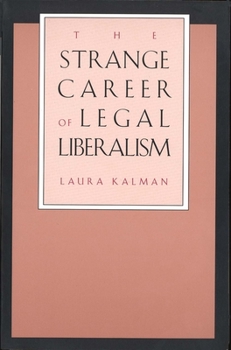The Strange Career of Legal Liberalism
Select Format
Select Condition 
Book Overview
Legal scholarship is in a state of crisis, Laura Kalman argues in this history of the most prestigious field in law studies: constitutional theory. Since the time of the New Deal, says Kalman, most law scholars have identified themselves as liberals who believe in the power of the Supreme Court to effect progressive social change. In recent years, however, new political and interdisciplinary perspectives have undermined the tenets of legal liberalism,...
Format:Paperback
Language:English
ISBN:0300076479
ISBN13:9780300076479
Release Date:August 1998
Publisher:Yale University Press
Length:384 Pages
Weight:1.25 lbs.
Dimensions:0.9" x 6.2" x 9.3"
Customer Reviews
2 ratings
The Legal Liberal Academic Establishment Examined
Published by Thriftbooks.com User , 15 years ago
This book was first published in 1996. It has assumed new importance recently given that several book-length studies have emerged focusing on the recent rise and impact of the conservative legal movement. Most notably, this trend is represented by Teles' insightful "The Rise of the Conservative Legal Movement." While Teles and others focus on a number of issues, e.g., legal public interest law firms, the Federalist Society, and the rise of the liberal legal network, in addition to the academic legal establishment, legal academia is the primary focus of Kalman's analysis. To really understand what the conservative legal movement was reacting against, this book is essential, even though somewhat dated. Kalman argues that legal liberalism became established in the period following the Warren Court's decision in "Brown," and fully supported an activist Supreme Court that implemented liberal goals. She also ties it to the topic of several of her other books, the legal realist movement which debunked many legal myths and argued for an experimental approach to law. As defenders of Brown, the legal liberals devoted much effort to promoting an activist Court and its role in making policy. Kalman, as usual, is quite effective in discussing the contrasting arguments on this issue, covering folks like Bickel, Henry Hart, Wechsler, Ely and Frankfurter. Was the Court meant to be composed of "Platonic Guardians" or did this undermine democracy? By the 1970's, legal liberals were more interested in reconciling judicial activity with democracy, by searching for objective foundations, looking at interpretivism, and suggesting text-based theories of interpretation. Also during this period, the conservative law and econmics movement, and process theory, presented challenges, as did later epistemological and hermeneutic theories. This intense academic polarization, Kalman suggets, led to many turning to history as a method to resolve these arguments about ultimate values--Kalman characterizes this as a "love affair with the past"-- which gives rise of the "republican revival" so prevalent in the historical writing of the 1970's and 1980's (e.g., Pocock). So ends Part I of the book that runs about 165 pages. Part II (running about 80 pages) is a discussion of how lawyers and historians have and should interact--a topic upon which Kalman had some firm views. While this is a vital topic as well, it is less germane to the present dialogue that is occurring about the development and impact of the conservative legal movement. It obviously does relate to the interpretative theories of folks like Justice Scalia and other Court conservatives; but I think the present value of the book lies more heavily with helping us understand the academic legal establishment and its history up to the founding of the Federalist Society and other conservative legal instrumentalities. To the uninitiated, Kalman's method of focusing upon arguments made in books and articles, and th
An entertaining, but dense, look at the insanity of modern legal thought.
Published by Thriftbooks.com User , 18 years ago
In her wonderful book, Kalman examines how legal theorists have attempted to justify legal liberalism in the post-war era. Legal liberalism is the idea that courts can bring about societal change through enforcing nationwide policy. The structure of this book is fairly simple; Kalman examines how theorists have attempted a variety of different means to justify legal liberalism in different decades. These have included history, moral, and political theory. Kalman grounds her examination firmly in how law schools became enmeshed in the academic university and began to look towards other professional disciplines for lessons, such as anthropology, history, political science, and sociology. As a historian, Kalman concludes with a lengthy discussion of the interrelationship between history and law and the possible strengths of mixing the two. This is a generally interesting book, but it tends to be dense at times, particularly in the discussions of postmodernism and the effects on legal thought. However, the density is not Kalman's fault; it is the natural result of a legal academia striving for a replacement to the (false) certainty that classicism once provided. I would recommend that this book be read in conjunction with William Wiecek's The Lost World of Classical Legal Thought because it provides a firm analysis of the classical model of legal thought, the collapse of which has created the void that legal theorists have attempted to fill over the last 60 years.






